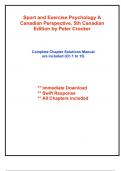Exam (elaborations)
Solutions for Sport and Exercise Psychology A Canadian Perspective, 5th Canadian Edition by Crocker - 2025 Published (All Chapters included)
- Institution
- Bethany College ( )
Complete Solutions Manual for Sport and Exercise Psychology A Canadian Perspective, 5th Canadian Edition by Peter Crocker ; ISBN13: 9780137930968...(Full Chapters included and organized in reverse order from Chapter 15 to 1)...1.Introducing Sport and Exercise Psychology 2.Personality in Sport and ...
[Show more]



